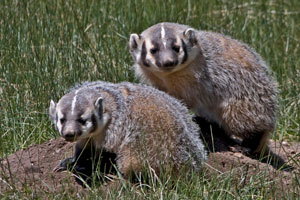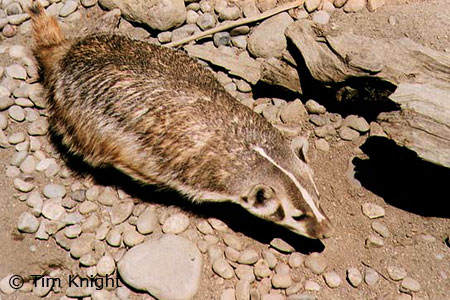

|
American Badger (Taxidea taxus) What they look like: The Badger is a brown fur-covered mammal with short legs and low profile. The head appears pointed and small for the body. They have short ears and a short, furry tail. Badgers weigh 4 to 12 kg. The body is flattened, and the legs are short and stocky. The fur on the back and sides of the animal ranges from grayish to reddish. The chest is a buffy color. A white stripe extends back over the head from the nose (see photo).
Badgers prefer to live in dry, open grasslands, fields, and pastures. They are found from high alpine meadows to sea level. Click the range map to learn more about the distribution of Badgers in Washington. What they eat: Badgers are carnivorous (meat eater). They eat a variety of small animals, including pocket gophers, ground squirrels, moles, marmots, prairie dogs, woodrats, kangaroo rats, deer mice, and voles. They also eat insects and birds.
Behavior: Badgers are solitary animals who are mainly active at night. They tend to be inactive during the winter months. They are not true hibernators, but spend much of the winter in cycles of torpor that usually last about 29 hours. (topor: a state of motor and mental inactivity with a partial suspension of sensibility.) Badgers are known to be excellent digging machines. Their powerfully built forelimbs allow them to tunnel rapidly through the soil and other substrates. They construct underground burrows for protection and sleeping. If threatened, they use hissing, growling and biting for protection. 
Reproduction: Female badgers prepare a grass-lined den before giving birth. Badgers are born blind and helpless with only a thin coat of fur. The eyes of the youngsters open at 4 to 6 weeks old. The young are nursed by their mother until they are 2 to 3 months old. The cubs (young badgers) may emerge from the den as early as 5 to 6 weeks old. Juveniles disperse at 5 to 6 months.
Did you know?

Badger photo by Tim Knight More information: American Badger - Animal Diversity Web More photos: Badger Photos on the Wildlife Web Photo courtesy of Natures Pics |
Animal silhouettes available to purchase »
Home | About Us | How to Participate | Biodiversity Modules | Projects | Maps | News | Resources